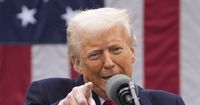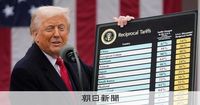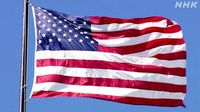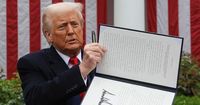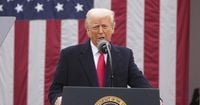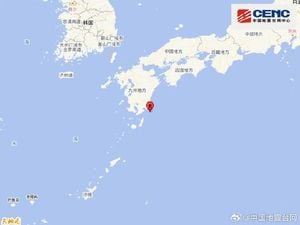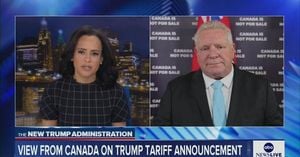On April 2, 2025, U.S. President Donald Trump announced a sweeping new tariff policy aimed at various trading partners, marking a significant escalation in the ongoing trade tensions. The policy introduces a uniform 10% tariff on all imports, alongside higher "reciprocal tariffs" specifically targeting countries deemed to have unfair trade practices against the United States. For Japan, this reciprocal tariff rate is set at a staggering 24%, while other countries like China will face a 34% tariff, the European Union (EU) will see a 20% rate, and the United Kingdom (UK) will incur a 10% tariff.
The tariffs are scheduled to take effect on April 5 for the uniform rate and on April 9 for the reciprocal tariffs. Trump characterized this move as a necessary measure to combat what he described as a national emergency caused by the outsourcing of American manufacturing and the resulting industrial hollowing.
In a speech delivered at the White House, Trump proclaimed, "April 2, 2025, will be eternally remembered as the day U.S. industry was reborn, the day the U.S. reclaimed its destiny, and the day we began to work to make the U.S. wealthy again." He criticized Japan for imposing a 700% tariff on U.S. rice imports and highlighted the significant number of foreign-made vehicles sold by Toyota in the United States.
The implications of these tariffs are profound, especially for Japan, which is expected to bear a disproportionate burden. David Bowering, the Asia trade director at Eurasia Group, noted that the impact on Japan would be severe and could strain diplomatic relations between the two nations. "Japan is a loser in this scenario," Bowering stated, emphasizing that the new tariffs could introduce significant tension into U.S.-Japan relations.
Mizuho Bank's chief market economist, Daisuke Karakama, echoed these sentiments, suggesting that the tariffs would likely suppress Japan's exports to the U.S. and could put upward pressure on the yen. He stated, "The U.S. reciprocal tariffs may suppress Japan's exports to the U.S., potentially strengthening the yen."
Concerns are also mounting regarding the overall impact on the Japanese economy. Takeshi Minami, chief economist at Meiji Yasuda Research Institute, warned that the new tariffs could derail the Bank of Japan's efforts to normalize monetary policy, stating, "This will put downward pressure on the Japanese economy, possibly derailing the Bank of Japan's monetary policy normalization."
Investment analysts are closely monitoring the stock market's response. The Nikkei index has already experienced significant fluctuations, with reports indicating a drop of 1500 yen on March 31, 2025, reflecting growing concerns about the economic outlook. Akio Iizumi, chief Japan economist at Mizuho Research & Technologies, noted that Japanese companies targeting the U.S. market from Asia would face severe challenges due to the new tariffs.
As the global market reacts, initial trading patterns suggest a risk-off sentiment, with the yen being bought as investors seek safe havens. Takuya Kanda, research department head at Gaitame.com Research Institute, remarked, "The market sentiment is bearish, suggesting a yen-buying trend."
In terms of economic projections, Tatsuo Kinouchi, executive economist at Nomura Research Institute, indicated that Japan's GDP could be pushed down by as much as 0.59% due to the tariffs. He stated, "The 24% reciprocal tariff is expected to have a significant negative impact on Japan's GDP, potentially pushing it down by 0.59 points."
The tariffs are also likely to affect Japan's trade balance, with expectations that the trade deficit with the U.S. could widen. Market participants are particularly concerned about the long-term implications of these tariffs on Japan's economic recovery.
Reactions from other countries have also been swift. The Chinese Ministry of Commerce announced on April 3, 2025, that it "resolutely opposes" the new tariffs and intends to implement countermeasures to protect Chinese interests. They criticized the U.S. for ignoring the balance of interests established through years of multilateral trade negotiations.
U.S. Treasury Secretary Bentsen, in a follow-up interview, advised countries not to retaliate against the tariffs, warning that such actions could escalate tensions further. He emphasized the importance of observing how the situation unfolds before making any decisions.
International responses vary, with countries like Switzerland and Brazil expressing their concerns. The Swiss President highlighted the need for a swift response to protect the nation’s long-term economic interests, while Brazil lamented the decision, stating it does not reflect the reality of their trade relationship with the U.S.
As the situation develops, market analysts are closely watching the potential for retaliatory measures from affected countries, which could lead to a broader trade conflict. The New York Times has described the U.S. administration's actions as an attempt to build a "North American fortress," suggesting that the tariffs may ultimately strengthen regional integration rather than isolate the U.S. in global trade.
In summary, the introduction of these reciprocal tariffs is reshaping the landscape of international trade, particularly for Japan, which faces significant economic challenges ahead. With the prospect of retaliatory measures hanging in the air, the future of U.S.-Japan relations and the global economy remains uncertain.
